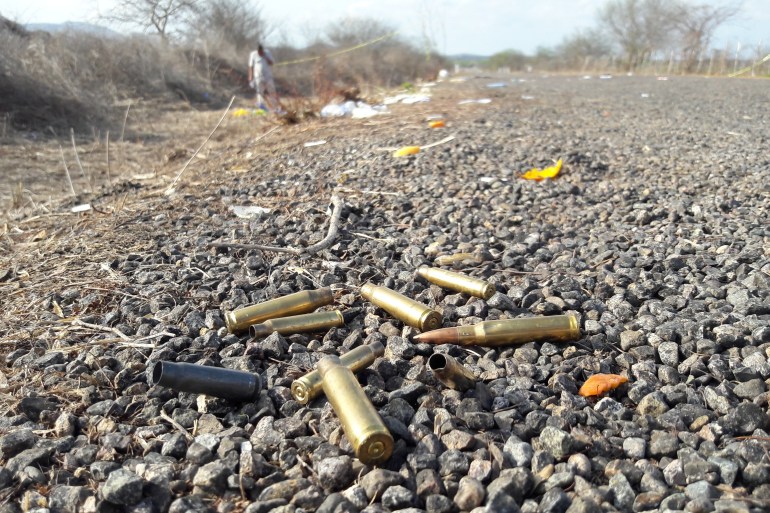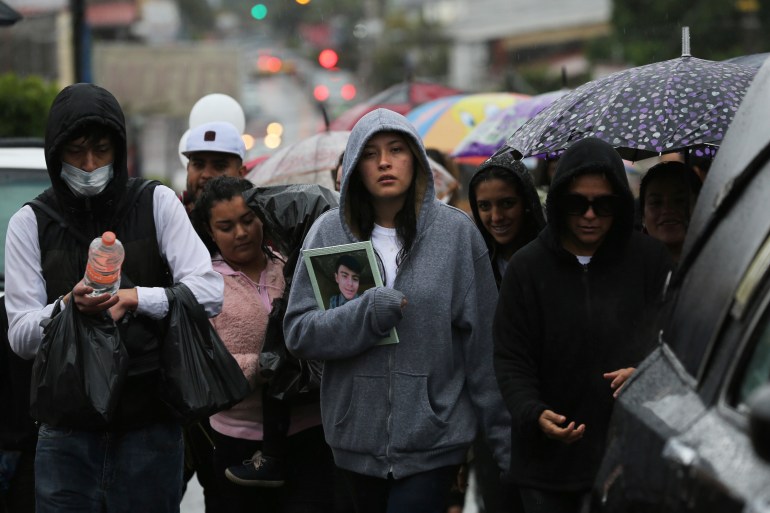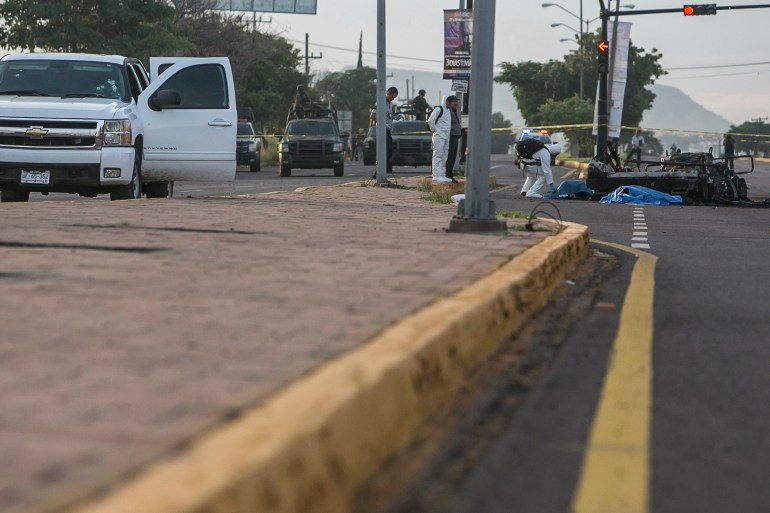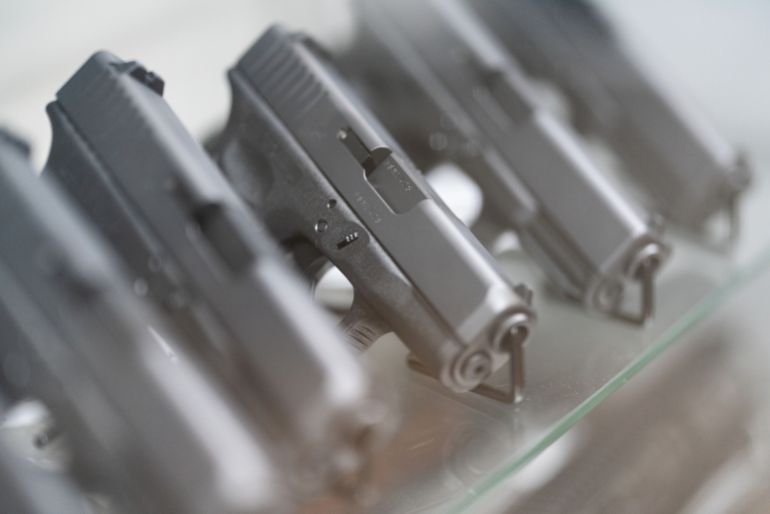The Mexican government took the unprecedented step of filing a lawsuit against US-based gun manufacturers and distributors in an American court. Here’s what could happen.

Mexico is seeking to hold US gun manufacturers and distributors accountable for high levels of gun violence in the country, where legal firearm ownership is restricted [File: Mario Rivera Alvarado/AP Photo]
By Ann Deslandes
18 Aug 2021
LISTEN TO PODCAST
Mexico City, Mexico – Three years ago, Cresencio “Chencho” Pacheco became one of the estimated 357,000 people in Mexico forcibly displaced from their homes due to conflict and violence.
Pacheco became a spokesperson for himself and 1,600 of his neighbours who fled their villages in the mountains of Guerrero state when a local group armed with hand grenades and firearms took over the territory for drug trafficking and other illegal activities.
KEEP READING Can a lawsuit stop Mexico’s ‘iron river’ of guns?
By Ann Deslandes
18 Aug 2021
LISTEN TO PODCAST
Mexico City, Mexico – Three years ago, Cresencio “Chencho” Pacheco became one of the estimated 357,000 people in Mexico forcibly displaced from their homes due to conflict and violence.
Pacheco became a spokesperson for himself and 1,600 of his neighbours who fled their villages in the mountains of Guerrero state when a local group armed with hand grenades and firearms took over the territory for drug trafficking and other illegal activities.
KEEP READING Can a lawsuit stop Mexico’s ‘iron river’ of guns?
Based on bullets found at the scene, some of the weapons wielded by the gang are believed to have been smuggled into Mexico from the United States.
The vast majority of the people displaced from Guerrero in November 2018 have never returned to their villages.

The vast majority of the people displaced from Guerrero in November 2018 have never returned to their villages.

Crescencio ‘Chencho’ Pacheco (left) listens as another member of his displaced community speaks, demanding security from the administration of Mexican President Andres Manuel Lopez Obrador [Photo: Ann Deslandes]
Some are scattered throughout Mexico, while many — like Pacheco — are now seeking asylum in the US due to the continuing threat posed by the gang that still occupies the area.
His story is just one example of how lax gun laws north of the border are fuelling violence in Mexico, which heavily restricts the sale and ownership of firearms.
“It has destabilised the country,” Pacheco told Al Jazeera of the guns that have poured into Mexico. He is currently living in temporary accommodations in the US while he waits for a decision on his asylum case.
Earlier this month, to help curtail the flow of illegal weapons, the Mexican government took the unprecedented step of filing a lawsuit against US-based gun manufacturers and distributors, alleging that their negligence has led to illegal arms trafficking into Mexico and fuelled violence and bloodshed.
Yet while the suit sends a powerful message, some contend it is unlikely to curtail the flow of illicit arms into Mexico.
Made in America, trafficked into Mexico
The lawsuit (PDF), which was filed in US federal district court in Massachusetts and is seeking $10bn in damages, takes aim at marquee brands in the US firearms business, including Smith & Wesson Brands; Barrett Firearms Manufacturing; Beretta USA; Beretta Holding; Century International Arms; Colt’s Manufacturing Company; Glock Inc; Glock Ges.m.b.H.; Sturm, Ruger and Company and gun supplier Witmer Public Safety Group, which does business as Interstate Arms.
The complaint contends that 70 to 90 percent of the guns recovered from crime scenes in Mexico were trafficked from the US, and that the majority of them were made by six US manufacturers: Smith & Wesson, Beretta, Century Arms, Colt’s, Glock and Ruger.
The complaint also highlights that “Mexico has one gun store in the entire nation and issues fewer than 50 gun permits per year” and claims that “a gun manufactured in the US is more likely to be used to murder a Mexican citizen (17,000 in 2019) than an American citizen (14,000 in 2019)”.
 Family and friends attend a February 5, 2020 funeral procession for one of the victims of a shooting at a video-game arcade in Uruapan, Mexico, where violence reached shocking proportions as cartels battled for territory [File: Marco Ugarte/AP Photo]
Family and friends attend a February 5, 2020 funeral procession for one of the victims of a shooting at a video-game arcade in Uruapan, Mexico, where violence reached shocking proportions as cartels battled for territory [File: Marco Ugarte/AP Photo]
A report (PDF) by the US Government Accountability Office released in February examining Bureau of Alcohol, Tobacco, Firearms and Explosives (ATF) data found that 70 percent of firearms reported to have been recovered in Mexico from 2014 through 2018 and submitted for tracing were from the US.
“These guns are legally purchased in gun shops or shows, mainly by US citizens and/or legal residents,” Alan Zamayoa, an analyst with global risk consultancy Control Risks, told Al Jazeera. “Once acquired either by gun traffickers or single individuals, guns are sold to the criminal groups intending to cross them into Mexico.”
Zamayoa said “the easiest and cheapest way” to transport guns from the US to Mexico “is through illicit crossing points along the border” – indeed, in the opposite direction of drug smuggling routes.
Guns are also smuggled through legal international crossings, noted Zamayoa. This usually occurs in collusion with customs officials; arms also get across the border in pieces, with different people crossing with individual or specific parts, and “once all the smugglers and parts are in Mexico, they reassemble the guns,” he said.
Because the figures in the February report only represent the firearms submitted to the ATF by the office of Mexico’s federal attorney general, the actual number is likely higher.
For its part, Mexico’s government estimates that more than two million weapons have been illegally smuggled into the country from the US over the past decade. They have helped fuel a rising gun homicide rate, which reached 13 homicides per 100,000 people in 2020, according to Mexico’s National Institute of Statistics and Geography.
Using the courts
Mexico’s lawsuit against US gun manufacturers follows other grand gestures by the administration of President Andres Manuel Lopez Obrador, also known as AMLO, to push back on its northern neighbour and signal a departure from the corruption and violence of its predecessors.
Indeed, from threatening to kick out the US Drug Enforcement Administration to accusing the US government of coup-mongering, grand gestures of Mexican sovereignty have become a hallmark of the AMLO administration.
“The Lopez Obrador administration seeks to refocus bilateral security cooperation on reducing homicides and reducing arms trafficking from the US, among other issues,” Stephanie Brewer, director for Mexico and migrant rights with the Washington Office on Latin America, a US-based think-tank, told Al Jazeera.
“The lawsuit comes in this context and sends a strong message on the importance that Mexico’s federal government attaches to this,” she added
Some are scattered throughout Mexico, while many — like Pacheco — are now seeking asylum in the US due to the continuing threat posed by the gang that still occupies the area.
His story is just one example of how lax gun laws north of the border are fuelling violence in Mexico, which heavily restricts the sale and ownership of firearms.
“It has destabilised the country,” Pacheco told Al Jazeera of the guns that have poured into Mexico. He is currently living in temporary accommodations in the US while he waits for a decision on his asylum case.
Earlier this month, to help curtail the flow of illegal weapons, the Mexican government took the unprecedented step of filing a lawsuit against US-based gun manufacturers and distributors, alleging that their negligence has led to illegal arms trafficking into Mexico and fuelled violence and bloodshed.
Yet while the suit sends a powerful message, some contend it is unlikely to curtail the flow of illicit arms into Mexico.
Made in America, trafficked into Mexico
The lawsuit (PDF), which was filed in US federal district court in Massachusetts and is seeking $10bn in damages, takes aim at marquee brands in the US firearms business, including Smith & Wesson Brands; Barrett Firearms Manufacturing; Beretta USA; Beretta Holding; Century International Arms; Colt’s Manufacturing Company; Glock Inc; Glock Ges.m.b.H.; Sturm, Ruger and Company and gun supplier Witmer Public Safety Group, which does business as Interstate Arms.
The complaint contends that 70 to 90 percent of the guns recovered from crime scenes in Mexico were trafficked from the US, and that the majority of them were made by six US manufacturers: Smith & Wesson, Beretta, Century Arms, Colt’s, Glock and Ruger.
The complaint also highlights that “Mexico has one gun store in the entire nation and issues fewer than 50 gun permits per year” and claims that “a gun manufactured in the US is more likely to be used to murder a Mexican citizen (17,000 in 2019) than an American citizen (14,000 in 2019)”.
 Family and friends attend a February 5, 2020 funeral procession for one of the victims of a shooting at a video-game arcade in Uruapan, Mexico, where violence reached shocking proportions as cartels battled for territory [File: Marco Ugarte/AP Photo]
Family and friends attend a February 5, 2020 funeral procession for one of the victims of a shooting at a video-game arcade in Uruapan, Mexico, where violence reached shocking proportions as cartels battled for territory [File: Marco Ugarte/AP Photo]A report (PDF) by the US Government Accountability Office released in February examining Bureau of Alcohol, Tobacco, Firearms and Explosives (ATF) data found that 70 percent of firearms reported to have been recovered in Mexico from 2014 through 2018 and submitted for tracing were from the US.
“These guns are legally purchased in gun shops or shows, mainly by US citizens and/or legal residents,” Alan Zamayoa, an analyst with global risk consultancy Control Risks, told Al Jazeera. “Once acquired either by gun traffickers or single individuals, guns are sold to the criminal groups intending to cross them into Mexico.”
Zamayoa said “the easiest and cheapest way” to transport guns from the US to Mexico “is through illicit crossing points along the border” – indeed, in the opposite direction of drug smuggling routes.
Guns are also smuggled through legal international crossings, noted Zamayoa. This usually occurs in collusion with customs officials; arms also get across the border in pieces, with different people crossing with individual or specific parts, and “once all the smugglers and parts are in Mexico, they reassemble the guns,” he said.
Because the figures in the February report only represent the firearms submitted to the ATF by the office of Mexico’s federal attorney general, the actual number is likely higher.
For its part, Mexico’s government estimates that more than two million weapons have been illegally smuggled into the country from the US over the past decade. They have helped fuel a rising gun homicide rate, which reached 13 homicides per 100,000 people in 2020, according to Mexico’s National Institute of Statistics and Geography.
Using the courts
Mexico’s lawsuit against US gun manufacturers follows other grand gestures by the administration of President Andres Manuel Lopez Obrador, also known as AMLO, to push back on its northern neighbour and signal a departure from the corruption and violence of its predecessors.
Indeed, from threatening to kick out the US Drug Enforcement Administration to accusing the US government of coup-mongering, grand gestures of Mexican sovereignty have become a hallmark of the AMLO administration.
“The Lopez Obrador administration seeks to refocus bilateral security cooperation on reducing homicides and reducing arms trafficking from the US, among other issues,” Stephanie Brewer, director for Mexico and migrant rights with the Washington Office on Latin America, a US-based think-tank, told Al Jazeera.
“The lawsuit comes in this context and sends a strong message on the importance that Mexico’s federal government attaches to this,” she added
.

Gun trafficking from the US has helped fuel Mexico’s high gun homicide rate, which reached 13 homicides per 100,000 people in 2020, according to Mexico’s National Institute of Statistics and Geography [File: Rashide Frias/AP Photo]
As Brewer observed, “This isn’t the first time that Mexico has signalled its interest in prioritising arms trafficking, but the current administration took this message to a new level.”
Mexico’s lawsuit could face a number of hurdles, chiefly the US’s Protection of Lawful Commerce in Arms Act, which shields gun manufacturers from nearly all civil liability and blocks victims and their families from suing them.
“US legislation makes it very difficult to sue gun manufacturers for the violence inflicted with their weapons, so the lawsuit faces a tough path ahead,” Brewer said.
One of the gun manufacturers Mexico is suing, Glock Inc, has labelled the lawsuit “baseless” and promised to “vigorously” defend itself.
Sending a message
Zamayoa said that even if the ruling favours the Mexican government, it won’t be enough to have a tangible impact on gun trafficking volume.
“Rather than reducing gun violence, a potential successful lawsuit is likely to be reflected in a change in the way criminals get access to guns,” Zamayoa said.

As Brewer observed, “This isn’t the first time that Mexico has signalled its interest in prioritising arms trafficking, but the current administration took this message to a new level.”
Mexico’s lawsuit could face a number of hurdles, chiefly the US’s Protection of Lawful Commerce in Arms Act, which shields gun manufacturers from nearly all civil liability and blocks victims and their families from suing them.
“US legislation makes it very difficult to sue gun manufacturers for the violence inflicted with their weapons, so the lawsuit faces a tough path ahead,” Brewer said.
One of the gun manufacturers Mexico is suing, Glock Inc, has labelled the lawsuit “baseless” and promised to “vigorously” defend itself.
Sending a message
Zamayoa said that even if the ruling favours the Mexican government, it won’t be enough to have a tangible impact on gun trafficking volume.
“Rather than reducing gun violence, a potential successful lawsuit is likely to be reflected in a change in the way criminals get access to guns,” Zamayoa said.

One of the gun manufacturers Mexico is suing, Glock Inc, has labelled the lawsuit ‘baseless’ and promised to ‘vigorously’ defend itself [File: Bloomberg]
“For example, criminals can become more involved in in-house gun production, or look for other markets outside the US to get their gun supply. Likewise, the theft of guns from security forces in Mexico can also increase,” he noted.
Still, Brewer said, “this lawsuit sends a strong message to the US on the importance of this issue to the Mexican government”, even if it does not succeed in court.
But, she added, it will also take reforms on the Mexican side to fully address the issue of gun violence in the country.
“Overall, the only real solution to Mexico’s criminal violence is through investigation and prosecution of criminal networks to reduce impunity and disrupt collusion and tolerance by state actors,” Brewer said, noting it is also necessary to have “professionalisation and accountability for Mexico’s police forces at all levels”.
SOURCE: AL JAZEERA
“For example, criminals can become more involved in in-house gun production, or look for other markets outside the US to get their gun supply. Likewise, the theft of guns from security forces in Mexico can also increase,” he noted.
Still, Brewer said, “this lawsuit sends a strong message to the US on the importance of this issue to the Mexican government”, even if it does not succeed in court.
But, she added, it will also take reforms on the Mexican side to fully address the issue of gun violence in the country.
“Overall, the only real solution to Mexico’s criminal violence is through investigation and prosecution of criminal networks to reduce impunity and disrupt collusion and tolerance by state actors,” Brewer said, noting it is also necessary to have “professionalisation and accountability for Mexico’s police forces at all levels”.
SOURCE: AL JAZEERA
No comments:
Post a Comment